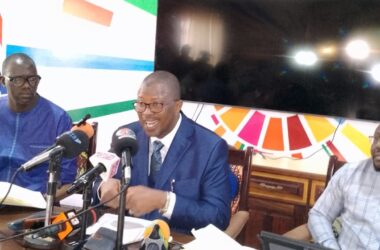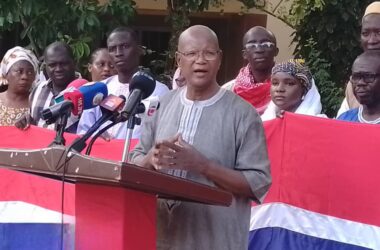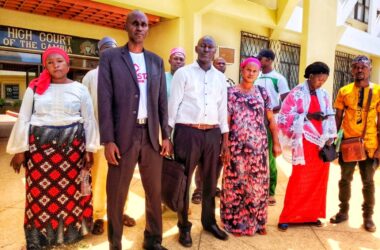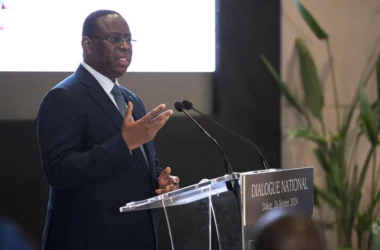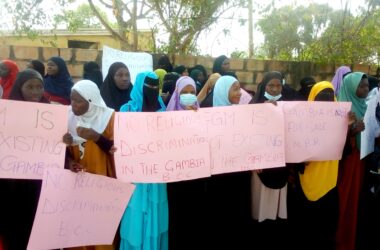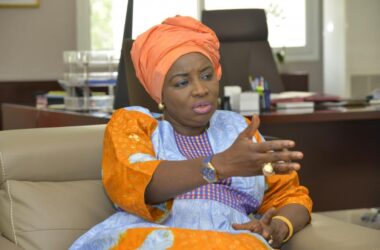2023 STATE OF THE NATION ADDRESS (SONA) DELIVERED BY HIS EXCELLENCY, THE PRESIDENT OF THE REPUBLIC OF THE GAMBIA, ADAMA BARROW GMRG, ON 8TH JUNE 2023 AT THE NATIONAL ASSEMBLY IN BANJUL
1. INTRODUCTORY REMARKS
Honourable Speaker of the National Assembly,
Honourable Members of the National Assembly,
Your Excellency, the Vice President,
His Lordship Chief Justice,
Members of the Diplomatic and Consular Corps,
Distinguished Personalities,
Ladies and Gentlemen,
- I always look forward to my annual engagement with this august body because it offers us the opportunity to interact formally as a constitutional requirement and informally as fellow citizens and complementary partners in the cause of national development.
- In view of our mandates within the major arms of government, we do not only represent the interests and aspirations of our people, but also form three distinct but unified and inseparable parts of the Government machinery. The need for cooperation is, therefore, obvious.
- Mr. Speaker, lest my address is mistakenly perceived as an activity report, let me explain that it is a precise outline of how my government fared during the 2023 legislative year, with highlights provided on key milestones, setbacks, plans, and legislative matters of direct importance to this Assembly.
- Government channels its development endeavours through the public sectors and the policies, projects, and programmes they execute.
My deliberation centres on such interventions, as well as bilateral and multilateral engagements and events of special relevance.
- Operational matters, management, and administrative functions are not given prominence, except where they have a direct bearing on my administration’s performance or have consequences of national interest. Elaborate details on the content of my address are readily available from the sectors.
- National development, especially in developing countries, cannot be discussed without reference to the pressure that global events and trends bring to bear on low-income nations.
- To do so means losing sight of the context and environment that shape what we do as human beings and how unforeseen challenges sometimes frustrate national efforts.
Reference will be made to these circumstances briefly, but I ask that you bear them in mind as you review my government’s achievements during the year under review.
- As customary, the address focuses on the sectors, and I will begin with the Finance and Economic Affairs sector as a basis for what follows.
2. FINANCE AND ECONOMIC AFFAIRS
Honourable Speaker,
- The Gambia relies heavily on imports for the consumption of basic commodities, including wheat and maize from Ukraine.
This means that the disruption in supply chains, which led to shortages in supply, translated into strong inflationary pressures on the economy.
- As at end-December 2022, inflation stood at 13.7 percent, from an initial projection of 5 percent. Generally, global inflation has significantly reduced the real incomes of people abroad. As a result, the Gambian economy faces reduced private remittance receipts and lower tourist arrivals, despite the strong recovery footings reported in 2022. These will continually worsen the negative impact on growth experienced from 2020 onwards.
- Revenue performance during the year clearly highlights the negative effect of the crisis. Total Domestic revenue collection in 2022 declined by ten (10) percent against the same period in 2021.
- Comparison of revenue performance from 2022 and 2023, between January and April, shows that domestic taxes have increased by 5% during the period, whilst customs and excise taxes increased by 20% over the same period.
- The increase in global oil prices put pressure on Government and forced us to subsidise fuel to lower the high pump prices. This had a negative impact on domestic revenue mobilisation and the 2022 national budget.
- With less attention on COVID-19, infrastructure development activities resumed and will remain a priority. In addition to the rural road projects implemented by the Ministry of Transport, Works, and Infrastructure, the road expansion and OIC-related projects are underway, as the country prepares to host the OIC summit by December, this year.
- Capital expenditure will, therefore, persist to contribute greatly to total expenditure.
- Apart from the Government’s commitment to the Medium Term Economic Fiscal Framework (2023-2026) to improve macro-fiscal stability, the new Green Recovery-Focused National Development Plan (RF-NDP) has Cabinet approval, and preparations are underway to launch it.
- The plan outlines key national priorities across the sectors and will guide development interventions in the medium term. It also mainstreams the Sustainable Development Goals (SDGs), African Union (AU) Agenda 2063, and the ECOWAS Vision 2030. Government will strengthen domestic resource mobilisation to finance the RF-NDP.
- An International Monetary Fund (IMF) team visited The Gambia to conduct a diagnostic exercise of the country’s governance and corruption vulnerabilities. The mission commended my administration for the progress achieved so far, especially for bringing various legislations in line with best practices, and they shared useful observations with us.
- Since 2017, The Gambia has engaged in governance reforms across our institutions. These include enactment of new laws, such as the 2018 Central Bank Act, the Access to Information Law 2021, and the Public Procurement Act 2022.
- Along these lines, Bills developed include those on anti-corruption, anti-money laundering, countering the financing of terrorism, as well as those on Public Finances, State-Owned Enterprises, and Banking. All these are meant to contribute to the achievement of our national goals and targets.
- Also related to economic growth and management are actions taken to modernise revenue mobilisation; for example, the digitalisation and automation initiatives introduced during the year under review are significant achievements worth reporting. Rolling out the GRA Automated System for Customs Data, ASYCUDA World, and the on-going efforts to develop an e-procurement platform will jointly upscale revenue generation for development purposes.
- Furthermore, my government has brought the banking sector regulatory and supervisory framework closer to international standards.
- With these, we look to more significant economic development prospects, despite the current global crises as setbacks to contend with.
3. AGRICULTURE
Mr. Speaker,
- The Agriculture sector is strongly committed to strengthening its policy environment and programme implementation efforts. In this respect, emerging challenges will be persistently addressed through new policies and initiatives.
- To provide examples of such undertakings, a national fertilizer policy has been formulated and validated, and the development of a strategic plan is at an advanced stage. This policy seeks to enhance fertilizer access and targets subsidy beneficiaries for greater production.
- In pursuit of commercial farming, the sector will promote mechanised land preparation by supplying labour-saving machines. Since harvesting is among the least mechanised production activities of the target commodity value-chain crops, investments will increase to mechanise the harvesting of cereals and stimulate increased mechanical threshing.
- My administration is also enhancing the capacity of breeders and introducing Gambian farmers to fortified, short-term, and high-yielding varieties that are resistant to the adverse effects of climate change.
- Using PPP models, we will foster the establishment of processing companies to establish processing and production systems. Hopefully, these interventions will generate employment and market value promotion.
- There will be an Incentive-Based Risk Sharing System for Agricultural Lending. The Ministry of Agriculture has initiated The Gambia Incentive-based Risk Sharing and Agricultural Lending Facility Project (GAMIRSAL) to improve access to finance by de-risking lending to the agriculture sector. The project will collaborate with financial institutions to avail farmers and value chain actors of the needed finance for a transformed Food System.
- The Lending Project and Inclusion Strategy will contribute to removing access barriers to credit for actors along the agriculture value chains, and beneficiaries would access credit through a risk-sharing mechanism
4. COMMUNICATIONS AND DIGITAL ECONOMY
Honourable Speaker,
- The creation of the Ministry of Communications and Digital Economy affirms the Government’s desire for rapid digital transformation and utilisation of ICTs for socio-economic development.
- On policy matters, the Ministry is developing a holistic Digital Economy Policy and Strategy to provide sound guidelines, in view of the new orientation and increased prioritisation of digitalisation. It is also formulating a comprehensive Digital Economy Master Plan in collaboration with the European Union.
- Concurrently, the process of developing a Cloud and an Open Data policy and regulatory framework through this important initiative has begun. The scoping exercise for the process was successfully done in November 2022.
- As part of digitalising of our government administrative system, Cabinet approved an Email Policy this year to encourage and promote the use of government emails and email platforms for effective implementation of the digital government initiative.
The policy will centre on transition routes into a more formal inter- and intra-government communications network.
- For more efficient regulation, preparation of a Communications Bill is in progress. It contains provisions to ensure a level playing field for all stakeholders.
Mr. Speaker,
- A Cybercrime Bill, Data Protection, and Privacy Bill will be tabled here during the course of this legislative year. These bills will instil confidence and security for the safe use of our digital systems and services, as well as combat crime and criminal activities online.
- Development of a Critical Information Infrastructure policy and a National Risk Registry Database will follow next.
- Government will also improve the connectivity and reliability of our communication infrastructure by investing in a second submarine cable. This will be funded by the World Bank under the USD 57 million West Africa Regional Digital Integration Programme (WARDIP). The financing agreement will be brought to this august body for ratification.
- Equally proposed is the adoption of a Start-ups Act during this Legislative year. This framework is to articulate provisions for start-ups and give the country’s youth more opportunities to reap the global digital dividends.
- The Long-Term Evolution (LTE) 4G network, commissioned in 2015 as part of the IsDB funded ECOWAN project, was expanded in 2022 with four new additional base stations. Since its commissioning, the LTE network has saved Government about D22.8 million annually, besides providing reliable connectivity for day-to-day use. The Ministry has allocated six (6) million Dalasi from its 2023 local development budget to support the LTE Network and related sector activities.
- Ensuring cyber resilient development has been a major focus of my government over the years. The adoption of the Cyber Security policy and strategy in December 2022 further demonstrated the Executive’s commitment to this matter.
- Mr. Speaker, there is quite an array of proposed interventions to report on here, but I will end by observing that a National Digital Literacy policy is in progress to provide informed guidelines on digital literacy and skills development. These are all highly commendable initiatives.
5. DEFENCE
Honourable Speaker,
- The Ministry of Defence (MoD) works closely with other security institutions to maintain peace and stability in the country. To achieve this, the Ministry has developed three crucial documents. They include the first-ever National Defence Policy, which has Cabinet approval.
In addition, a Defence Strategy and Implementation Plan, funded by the UK, were completed in October 2022.
- The Ministry also has Cabinet approval to accede to the Arms Trade Treaty (ATT), and it is working on the ratification process. The ATT Voluntary Fund provided funding through Safer World Organization to facilitate the ratification and implementation process of the Treaty.
- The Terms and Conditions of Service for Officers and Soldiers, 1993 of The Gambia Armed Forces (GAF) is under review. Similarly, work on The Gambia Armed Forces Bill is progressing to replace the current Act of 1985.
- Through the Ministries of Defence and Finance, and with support from the Republic of Türkiye and the People’s Republic of China, Government has procured military vehicles and other specialised equipment for peacekeeping missions and ease of daily military operations, especially along the border.
- Mr. Speaker, the Armed Forces continue to forge healthy civil-military relations to improve on the existing cordial relations through regular consultations and outreach, such as providing free medical services and education.
- Significantly too, the Ministry and GAF will maintain close collaboration with other security agencies to ascertain a safe environment for every person in the country.
- Following the unfortunate resurgence of conflict in Cassamance between the MFDC and the Senegalese Armed Forces, GAF monitors the affected areas in Foni to guarantee the safety of all Gambian citizens. In this regard, they conduct robust patrols in the area. We thank them for their vigilance and devoted service to the nation.
6. FISHERIES, WATER RESOURCES AND NATIONAL ASSEMBLY MATTERS
- Honourable Speaker, the Fisheries sector is a key contributor to The Gambian economy, accounting for 10% of GDP in 2022 and providing direct employment to over 30,000 people.
- To keep up the momentum, the Ministry of Fisheries recently designed and validated a draft National Fisheries and Aquaculture Policy (2022-2031), and it is now set for submission to Cabinet.
- The Ministry is investing in the artisanal fisheries value chain to alleviate post-harvest challenges. With funds from the EU-Gambia Sustainable Fisheries Partnership Agreement, the construction of two fish handling platforms in Tanje and Gunjur, worth over ten million Dalasi, are ongoing to improve the hygienic conditions and durability of fish and fishery products.
- Honourable members, on revenue realised in the sector from January 2022 to May 2023, D34 million was generated from landing, D83 million from licensing and D30 million from EU support, amounting to D148 million.
- The European Union, under the Sustainable Fisheries Partnership Agreement, continues to provide the fisheries sector with D30 million Dalasi support annually. From this, D15 million Dalasi is to strengthen the sustainable management, conservation, and the development of the sector. The remaining D15 million Dalasi serves as financial compensation for access.
- Mr. Speaker, major reforms are progressing to lead to more efficient management of the country’s Water Resources, in conformity with Integrated Water Resources Management (IWRM) principles.
- In this vein, The Gambia Water Bill 2020 is available for enactment to replace the National Water Resources Council Act of 1979.
- Through support from the Government of Japan, twenty (20) additional solar-powered piped-water supply system for installation in 2022-2023 will serve 80, 000 people in our rural communities. The Project is ongoing, and it is scheduled to end by December 2023.
7. GENDER, CHILDREN, AND SOCIAL WELFARE
Mr. Speaker,
- A range of new policies developed by this sector guide the strategic development efforts and programme activities of the Ministry of Gender, Children, and Social Welfare.
- On programme implementation, the Women Enterprise Fund introduced in 2020 has benefited more than 93,000 women entrepreneurs, with D68 million disabused to 628 Women Groups. The recovery rate during the past three years stands at 75% and 53%, respectively, for the first and second disbursements. In 2023, about 550 women groups will be reached countrywide through the same arrangement.
- The Sahel Women Economic Empowerment project, which is at its preparatory stage, will be implemented throughout the country from 2024 to 2026. The project is to economically empower women and girls through entrepreneurship and livelihood skills training. It will also support in-school girls to complete grade twelve and women to access relevant information and reproductive health services. It is a World Bank funded project.
- To further enhance the legal environment for the welfare of children, the sector has submitted the revised draft of the 2005 Children’s Act to the Justice Ministry for review. They have also finalised the development of an integrated and inclusive Children’s Policy.
8. BASIC AND SECONDARY EDUCATION
Mr. Speaker,
- To make education readily accessible to children from poor families, as well as rural communities, my government uses resources from both the domestic budget and development partners to provide innovative ways of reaching underserved areas.
In this regard, a significant surge in enrolment has been registered at all levels of the school system.
- Specifically, Early Childhood and Development enrolment increased from 126,573 in 2021 to 130, 952 in 2022, whilst Lower Basic School enrolment increased respectively from 401,333 in 2021 to 414,477 in 2022. Similarly, Upper Basic School enrolment increased from 119,405 in 2021 to 123,081 in 2022 and Senior Secondary School enrolment increased from 76,537 to 78,706. These are significant increases.
- To meet the increasing demand for education, my government increased the number of schools for all levels from 3,426 to 3,518 between 2021 and 2022.
- To ensure quality education delivery, we consistently train teachers for both Basic and Secondary schools. Through these training packages, a significant increase in the number of qualified teachers is evident at all levels of the school system. At the Early Childhood Development level, for example, the trained facilitators increased from 3,018
in 2021 to 3,283 in 2022.
- At the lower basic level, the trained and qualified teachers increased from 10,614 to 11,302 between 2021 and 2022. Similar trends exist at the upper and senior secondary school levels, showing an increase from 5,787 to 5,881 and 3,211 to 3,394, respectively.
- As a result of all the investments in both access and the quality of education delivered, the number of students attaining zero credits or zero passes in the West African Senior Secondary Certificate Examinations dropped significantly from 1,477 to 884 between 2021 and 2022. This represents a percentage drop from 9.4 to 5.91 percent.
- The drop in the fail rate corresponds with the education policy target of making sure that every WASSCE student goes home with a certificate.
- At the upper basic level, the number of students attaining zero passes (or aggregate 54) in The Gambia Basic Education Certificate Examination dropped from 2,044 to 1,962, translating into a percentage drop from 8 to 7 percent.
- On the other hand, students attaining aggregate 6 increased from 19 to 31 during the same period. Furthermore, the number of students with the government pass mark of aggregate 42 and below for entry to Senior Secondary Schools improved from 47.2 percent in 2021 to 49.7 percent in 2022.
- Despite all these gains, my administration remains committed to better quality education. To this end, a Teacher Competency Assessment, piloted in 2020 and 2021, has been rolled out. The assessment ensures that teachers who graduate from The Gambia College at diploma and advanced diploma levels have the basic standards, competence and content knowledge to be recruited to teach in public schools.
- We are collaborating productively with our development partners, and I thank them most sincerely for their laudable support.
- Through such partnerships, 2,597 new classrooms and 3,116 toilet cubicles in the Madrassas and conventional schools were built within the last five years. 1, 549 classrooms were rehabilitated during the same period and 10 schools were identified for complete renovation in 2022. 498 classrooms and 456 toilet cubicles are currently under construction.
- Finally, because teacher factors contribute to performance, the sector has built 1,076 rooms countrywide for teacher accommodation. There are plans to increase the number significantly to ease accommodation challenges for teachers and motivate them for better output.
9. HIGHER EDUCATION, RESEARCH, SCIENCE AND TECHNOLOGY
Honourable Speaker,
- The tertiary and higher education sector remains committed to equitable access to quality tertiary and higher education for all Gambians, as well as promoting and strengthening research, science, innovation and technology in The Gambia. In this direction, its transformation programme is on course.
- In line with the new focus on TVET, through its Strategic Plan (2021-2025) and in collaboration with its partners, the Ministry is expanding access to TVET programmes. In this respect, the University of Applied Science, Engineering, and Technology will dually provide higher education and TVET programmes.
- My administration provides scholarships and financial assistance to needy and deserving students to undergo training programmes both within and outside the country.
- At the UTG alone, over 1,600 students are on government scholarship, and over 500 students from other tertiary institutions benefit from government scholarships. This is in addition to the 85 bachelor’s degree students in Engineering at USET.
- The Government, through the Ministry, has allocated over D100 million for scholarships and financial assistance to deserving students. Additionally, the Ministry plans to implement a student loan scheme from this year on for more students to access higher education programmes.
10. INTERIOR
Mr. Speaker,
- The Ministry of Interior, in partnership with the International Organization for Migration – The Gambia and with funding from the Switzerland Federal Department of Foreign Affairs, has launched the Assisted Voluntary Return and Reintegration capacity building project for The Gambia.
- The project aims to strengthen the capacity of about forty government officials directly involved in migrants’ Return and Reintegration in the country by equipping them with the needed skills and resources to manage return and reintegration processes.
- Honourable members, the Ministry of Interior is establishing a Peace Building Unit and creating Regional and National Councils for Peace and Social Cohesion, as recommended by the Truth, Reconciliation, and Reparation Commission.
- The Infrastructure for Peace (I4P) project will strengthen the capacity of the state and other existing agencies for peace and collaborative dialogue, while reducing the likelihood of current and future threats to peace in The Gambia in a sustainable manner.
- Mr. Speaker, there is a decrease in the number of crimes recorded in the third quarter of 2022. It decreased by 12.6%, compared to the third quarter of 2021. A total of 1426 cases were reported in the third quarter of 2021, while in the third quarter of 2022, 1247 cases were registered. We commend the Police for this remarkable decrease but urge them to lower the rate much further.
- In a bid to enact a new Immigration Service Act, an Immigration Service Bill was submitted to the Ministry of Justice for their input. After its validation and submission to Cabinet, it will be brought to this august Assembly.
- On revenue collection, The Gambia Immigration Department collected D104,407,130 from January to December 2022, as opposed to D103,362,940 in 2021.
The increase is slight due to the global economic situation, but revenue collection will improve much better this year.
- A key achievement of the Immigration Department was the development of the Standard Operating Procedures (SOP) and its official launch in November 2022.
- The primary objective of the SOP is for Handling of Smuggling of Migrants Cases in the country. The procedures support the Department and stakeholders to understand better smuggling of migrants and its legal implications and legislative arrangements.
11. THE LEGAL AND JUDICIARY SECTOR
Mr. Speaker,
- The strategies and policies adopted by the Ministry of Justice are geared mainly towards transitional justice, good governance, rule of law, and access to justice. In this regard, the Legal sector intends to adopt a Strategic Plan that reflects the Government’s vision.
- In addition, it has drafted the Victims Reparation Bill to create an independent body to administer reparations for victims. This will cover all victims of human rights violations, not leaving out the victims of April 10th and 11th.
- In 2022, several Acts were enacted, such as the Disabilities Act, and The Gambia Public Procurement Authority Act. Meanwhile, the Anti-Corruption Bill is with this august Assembly for consideration.
- My government also approved The Gambia Prisons Amendment Bill, 2023 to help establish The Gambia Prisons Services and The Gambia Prison Service Council to regulate the prisons.
- Furthermore, the sector is working on the Constitutional Review Process. The process is guided by relevant legal and legislative considerations as well as our national interests. For now, it is essential to determine the necessary legislative amendments to support the next phase of the review process.
- Mr. Speaker, the Ministry of Justice appointed twelve State Counsel in the beginning of this year. The objective is to decentralise legal services by designating some of the State Counsel to various regions of The Gambia. This is to provide speedy and accessible justice delivery service to the public.
- Turning to the Judiciary sub-sector, 11,568 new cases were filed across all the courts and tribunals in the country in 2022. This represents a significant increase of 30% on the 8882 cases for 2021. Altogether, 6,800 cases, representing 58%, were disposed of, thus marking an increase of 1,978 out of the 4822 cases disposed of in 2021.
- As reported during the last Legal Year celebration, the Judiciary is doing very well and has regained public confidence, hence the increase in new cases. We encourage them to keep up the momentum.
12. PUBLIC SERVICE, ADMINISTRATIVE REFORM, POLICY COORDINATION, AND DELIVERY
- Mr. Speaker, the new Ministry of Public Service, Administrative Reforms, Policy Coordination, and Delivery is mandated to undertake overall oversight of the implementation of Public Service Policies and programmes of The Gambia.
- Since its inception, the Ministry has been working on strengthening the Foundational Human Resource Management Policies, Practices, and Data to reduce manual processes.
- The process is to result in improved human resource management, increased reliability, and transparency of human resource data.
These are necessary for subsequent digitised Human Resource processes and data processing.
- Currently, the Ministry is working with the World Bank to upscale the effectiveness and expand the functionalities of government systems for engagement with citizens on processing complaints.
- Mr. Speaker, the Department of Strategic Policy and Delivery, serving as the Technical Unit of the Ministry of Public Service and also the Secretariat of the National Economic Council, regularly provides instrumental support to my Office.
- Through the National Economic Council, regular meetings were held in 2022 to improve coordination between the institutional heads of the productive sectors of the economy.
The meetings provide a platform for participants in key economic activities to adequately brief my Office on the economy and promote coordination and information sharing on critical economic issues.
- Mr. Speaker, a President’s Delivery Forum was held for the first time in The Gambia in October 2022 for presentation of key sector updates on project implementation in the sectors. The outputs of the forum are to feed into ground-breaking project monitoring tools to track project contracts and implementation in a timely manner.
- Implementation of the Civil Service Reform Programme, 2018-2027, is already in motion to transform the Public Service and make it more efficient and effectively responsive to the needs of the nation.
As a new development, the Ministry is arranging to institutionalise an electronic clocking system to hold civil servants accountable and maintain punctuality and discipline at work.
- Also, my office has signed performance contracts with State-Owned Enterprises (SOEs) to monitor service delivery. The Ministry of Finance undertook the initial monitoring exercise for the first quarter of 2023, with focus on GNPC, SSHFC and GPA. Meanwhile, GIA, GPPC, GGC, and GAMPOST are scheduled to sign a performance contract each by June 2023 to take effect from the 2024 Financial Year.
- These moves indicate my government’s preparedness to set public service delivery targets. Such accountability tools are signposts for the implementation of our national development plan, and they need to be implemented in collaboration with all Ministries, Departments, and Government Agencies.
13. TRANSPORT, WORKS, AND INFRASTRUCTURE
Honourable Speaker,
- Despite the Post-COVID-19 recovery challenges, the Transport, Works, and Infrastructure sector registered impressive results during the period under review.
The sector steadfastly focussed on road construction, resurfacing, reconstruction, upgrading to Asphalt standard, and rehabilitation of selected roads across the country.
- To mention examples, the reconstruction of the Kerewan-Njawara road to bituminous standard is in progress and stands at 90% completion. 60% of the 86-kilometre paved roads in the Niumi-Hakalang area has been completed. Lot 1 of the North Bank Road is complete, and Lot 2 is 65% complete. They are 102 kilometres long.
- The construction of the Kiang West roads is ongoing, with the completion status of the 39 kilometres of paved road at 71%.
- In a similar development, the Government recently secured funding from The Saudi Fund for Development (SFD), equal to 50 million U.S Dollars, to construct 50 kilometres of roads in the Greater Banjul Area. Works on this project are ongoing.
- From the Kuwaiti Fund for Arab Economic Development, Arab Bank for Economic Development in Africa, and the Islamic Development Bank, Government secured 79.8 million US Dollars to upgrade the Bertil-Harding Highway into a three-lane dual carriageway of 22 kilometres. It stretches from Yundum to Sting Corner. 55% of the civil works is complete.
- My administration now plans to upgrade 1,200 kilometres of selected roads in the next five years and this year, the Ministry will construct a length of 345 kilometres across the country.
- Like the new Basse Main market, I am glad to state that the first phase of the Brikama market is complete and was inaugurated in March of this year. Phase 2 is at the Tender stage.
- The Public Building Facilities Management Bill is with this august Assembly for consideration to develop and promote policies and regulations for effective management of government estate.
- Mr. Speaker, formal negotiations are on-going to improve the port and to build a new one. The Technical committee on the new port has submitted its report to the Ministerial Committee for their review, consideration, and onward submission to Cabinet for advice.
- On air traffic, analysis of actual figures for 2022 indicate that 359,909 passengers were handled at the Banjul International Airport, which shows an increase of 44.3% over the previous year. Projections suggest that this upward trend will persist.
13. TOURISM AND CULTURE
Mr. Speaker,
- The National Council for Arts and Culture is working with UNESCO on a Regulation for the National Endowment Fund for Arts. When established, the Fund will finance various cultural and artistic activities, which is useful for the tourism sector. The draft Regulation is ready for validation and, thereafter, submission to Cabinet.
- To boost tourism and position The Gambia as a homecoming hub for our African brothers and sisters in the Diaspora, The Gambia will observe the bi-centenary anniversary of the occupationofGeorgetown, MacCarthy Island, by the British and the subsequent arrival of the Liberated Africans on the Island. The festival will take place in the second quarter of this year.
- With relief, Tourism is growing again steadily. According to submissions from the G.T. Board, tourist arrivals picked up over the years from 89,232 in 2020 to 102,460 in 2021, and 182,795 in 2022.
- Arrivals from our traditional markets increased, except for the 10% drop from Denmark. Arrivals from the non-traditional markets increased by 47%; that is, 10,908 tourists, compared to the same period in 2021. The sector projects 206,558 tourists this year, if all goes well.
- It is encouraging, Mr. Speaker, that the Tourism sector has, so far, recorded 95% graduate employment out of 400 annual graduates from the Gambia Tourism and Hospitality Institute. An expansion programme in tourism and hospitality training upcountry, in partnership with the international Trade Centre under the YEP project, is earmarked for this year. Over 500 young Gambians will participate in various programmes to build capacity and create employment opportunities.
14. TRADE, INDUSTRY, REGIONAL INTEGRATION, AND EMPLOYMENT
Honourable Speaker,
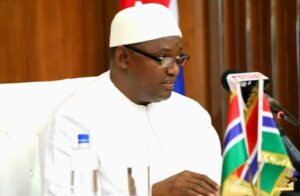
- This sector is focussing on improving the business environment, promoting private sector investment, supporting Micro, Small, and Medium Enterprises (MSMEs) for trade development, employment creation, and strengthening bilateral and multilateral trade cooperation.
- For regulation purposes, the sector has reviewed and updated the Labour Act 2007. The draft Bill is awaiting a third reading by this august body. Its enactment will bring our labour laws to ILO standard and facilitate labour administration in the country. It will also encourage employment.
- To strengthen labour administration, the sector is revising the Injuries Compensation and Factories Act. It will be submitted to this Assembly ultimately.
- In November 2022, I launched the National Employment Policy and Action Plan (NEAP) 2022-2027 to reduce unemployment decisively. The Ministry of Trade, Industry, Regional Integration, and Employment has established a National Employment Technical Committee set for inauguration. It comprises Public, Private sector, and Development Partners, together with Civil Society for implementation of the NEAP.
- The committee will report to a Cabinet sub-committee on employment. This demonstrates commitment at the highest level of government to address unemployment and underemployment and, by extension, poverty. The policy targets creating at least 150,000 jobs in five years.
- Regarding Consumer and Competition culture, a technical Committee is reviewing the Competition Act 2007 and the Consumer protection Act 2014 for effective enforcement of the Act and promotion of a competition culture in the economy.
- The administration will continually conduct market studies into the essential commodities and look into expired products as well as the pharmaceutical sector.
- Besides protecting consumer rights, a major objective of this undertaking is to curb anti-competitive practices, amid the current supply chain challenges and surging prices.
- In the same vein, to enhance fair trade and rationalise prices, especially of essential commodities, my government has resolved to streamline and rationalise the national measurement system.
The Ministry has completed the necessary legal framework, so I urge the Assembly to approve the Legal Metrology Bill 2022 for immediate implementation.
Mr. Speaker,
- Ten out of the seventeen international companies GIEPA granted an SIC have started operations. Six are now establishing their company infrastructure, but one company is yet to start operations. The planned investments from these companies amount to 70 million US Dollars, with an estimated 2130 jobs created when all the companies are fully operational.
- The Gambia remains active in Phase II negotiations of the AfCFTA, and we have prepared draft tariff schedules through a consultative process.
The tariff Offers, covering the 90% tariff for the liberation, 7% tariff for sensitive products, and 3% tariffs for exclusion, have been submitted to the AfCFTA Secretariat.
- The Ministry will embark on a sensitisation mission, as defined in the communication strategy, to raise awareness on the AfCFTA, update the National Trade Policy (2024-2029), and develop the Africa Growth and Opportunity Act utilisation strategy (2023-2028).
15. YOUTH AND SPORTS
Mr. Speaker,
- Young people are the most productive segment of society and, thus, are stakeholders in the national development process. They face substantial barriers, however, in their quest to be productive and empowered citizens of the country.
- Insufficient access to knowledge, information, and strategic education is one of barriers making them less competitive at both the national and international levels.
- In this respect, the Youth and Sports Ministry is devising strategic initiatives to increase support to the youth and their areas of development, especially sports. To achieve this, the Development Levy established within the framework of the NDP (2018-2021) dedicated to the sector is to develop a responsive development roadmap for implementation.
- In sports, The Gambia is doing very well in various competitions. Football, athletics, beach volleyball, and martial arts are typical examples. I congratulate all our sportspersons and officials on their successes, the U20 football team most notably inclusive. The Government will remain solidly supportive of the sector.
Mr. Speaker,
- Several bills and acts are under review to enhance the legal environment for youth and sports advancement. They are the Youth Bill and Sports Bill, the NYSS Act 2015, PIA Act 2015, and NEDI Act 2013. The Ministry will table these legal instruments before this August Assembly for consideration.
- Furthermore, with the support of the Commonwealth Secretariat, the sector will develop a New Sports Policy (2023-2032).
- Apart from intensifying and expanding the NYSS Apprenticeship Training Programme to reach out to many more young people, the mandatory National Youth Service Programme targeting university graduates is under consideration for implementation.
16. FOREIGN AFFAIRS, INTERNATIONAL COOPERATION, AND GAMBIANS ABROAD
Honourable Speaker,
- My government remains obliged to pursuing a foreign policy anchored on the promotion of our national interests, respect for sovereignty, and the territorial integrity of nations.
- We will scale up strategic bilateral cooperation and partnership arrangements aimed at complementing national efforts in pursuit of our development objectives.
- Our foreign policy remains forging more collaborative efforts on the international scene, based on our shared principles and values, strengthening partnerships across the globe, and active participation in relevant regional and other international organisations.
- The Ministry of Foreign Affairs’ draft Foreign Service Bill and Regulations respectively are near completion. It is hoped that these documents will further strengthen the institutional framework of the sector and ensure achievement of our national desired goals and objectives.
17. LANDS, REGIONAL GOVERNMENT, AND RELIGIOUS AFFAIRS
- At present, Mr. Speaker, the Lands Ministry is developing a National Land Policy with support from the World Bank. The policy will, among other issues, cover land-related conflicts, security of title, protection of the right to land, especially for women and children, and efficient land management. It will eventually be subjected to Cabinet review.
- Closely related to addressing youth and women matters within this sector is the Job, Skill, and Finance Programme for Women and Youth in The Gambia. It is a four-year initiative funded by the European Union (EU) through the United Nations Capital Development Fund (UNCDF) at a tune of 15.2 Million Euros. The programme aims to contribute to stabilising the economic, social, and security situation of the country by facilitating the social inclusion and employment of youth and women.
- In The Gambia, the Non-Governmental Organisations (NGO) Affairs Agency oversees NGO activities. The Agency was established in 1996 through Decree 81. A new NGO Bill is now at an advanced stage to improve NGO operations in the country.
- Meanwhile, out of one hundred and twenty-six registered NGOs, eighty-seven renewed their status in 2022, twenty-one were de-registered based on non-compliance issues. One phased out and six are yet to renew their status.
18. INFORMATION
Mr. Speaker,
- The new Ministry of Information has shown unprecedented readiness to pay more attention to the development of the information value chain through fresh initiatives.
- The Ministry is, for instance, collaborating with USAID to formulate a medium-term strategy (2023-2028). This strategic plan is expected to consolidate democratic pluralism and will link neatly with the Access to Information Act 2021 (ATI-21).
- The Ministry will appoint Information Commissioners and establish an Information Commission Secretariat for the realisation of the ATI-21 objectives. The Act represents an enviable milestone in our democratisation process and serves as a vivid symbol of the leadership’s commitment to universal access to information.
- Importantly also, the Information and Communications Act 2009 will give way to the Information Bill – 2023 as a means of repositioning the Ministry of Information.
In addition, the Personal Data Protection and Privacy Bill 2023 has been reviewed, finalised and submitted for Cabinet approval. Once approved, the document will be forwarded to this august Assembly for appropriate action.
- Aside from these, with the assistance of the UNESCO Regional Office in Dakar, the Information sector has developed a Policy on Community Media Sustainability to strengthen the modalities and conditions for stable income generation and long-term sustainability of the media community.
19. OFFICE OF THE VICE PRESIDENT
Mr. Speaker,
- The National Population Commission Secretariat, as the Coordinating Authority for the National Population Policy and Programme, is currently at the advanced stage of developing a new National Population Policy. The policy seeks to address population trends and dynamics in relation to sustainable socio-economic and environmental development.
- The Population Policy is also aimed at improving the quality of life of everyone, especially the most vulnerable. The UNFPA country programme and the World Bank deserve commendation for their sustained support to the Secretariat.
Honourable Members,
- Following Cabinet’s approval of the National Nutrition Policy (2021-2025) in December 2021, the National Nutrition Agency, with technical and financial support from UNICEF and the World Food Programme, formulated a Multi-Sectoral Nutrition Strategic Plan in 2022.
- The Plan is designed to guide implementation of all nutrition and nutrition-related programmes and activities in the country up to 2025.
- In view of my government’s priorities, as outlined in the National Development Plan, in 2022, the National Nutrition Agency and partners continued implementation of the Nafa Programme, which is a component of The Gambia Social Safety Net Project. It is a 31 million US Dollar project, jointly supported by the World Bank and the Government.
- From the commencement of Nafa in 2021 to date, a total of 16,957 extremely poor households from the 20 poorest districts across 825 communities in WCR, LRR, NBR, CRR and URR have received bi-monthly payments of D3000.00.
- Additionally, for the first time in the country, there will be legislation on social protection. The draft Bill will be presented to this august body this year. It will seek to set standards for social service delivery to the poor and vulnerable communities, especially marginalised groups, such as people living with disability, widows, orphans, and people living with HIV/AIDS.
- Mr. Speaker, 2022 was quite engaging for the National Disaster Management Agency (NDMA). The Gambia experienced disasters, such as flash floods, windstorms, and fire outbreaks. During the period, NDMA and partners provided humanitarian support in cash and kind to many affected households across the regions.
- The National Disaster Management Agency policy developed in 2008, however, is now obsolete. As a result, NDMA has commenced the formulation of an updated Policy and its accompanying strategy to address emerging challenges.
- The Gambia is a member of the Africa Risk Capacity and will benefit from a pay-out of 187,641 US Dollars from this body. It is to support districts affected by drought in 2022 due to late planting. The regions are specified in the Africa Risk View report.
- In December 2022, the Food Safety and Quality Authority validated the first National Food Safety Policy, with support from the European Union WACCOMP Project and the World Health Organisation. The document clarifies Government’s position on food safety and quality interventions and sets out implementation measures of the country’s food safety system.
20. PETROLEUM AND ENERGY
Honourable Speaker,
- The energy sector remains my government’s priority, and we will steadfastly mobilise resources for its transformation. Also, we will maintain our relationship and work with all relevant partners for the successful implementation of the electricity roadmap. The roadmap calls for universal electrification by 2025, integration of variable renewables, and investment in low-cost generation options.
- At the heart of this process is the National Water and Electricity Company (NAWEC), which is being restructured for operational viability and sustainability.
- At the moment, the constituent project components managed by NAWEC include The Gambia Electricity Restoration and Modernisation Project, ECOWAS Regional Electricity Access Project, The Gambia Electricity Access Project, Nationally Appropriate Mitigation Actions Based Rural Electrification with Renewable Energy Project, AFD Water Supply Project in the Greater Banjul Area, the OIC water project, and the EEP Gambia project. All these are designed to feed into the overall strategy of attaining universal access to electricity in the country.
- It is not surprising that the petroleum industry is affected by the impact of COVID-19 and the Russia-Ukraine war. It is also being impacted by the global agenda on energy transition. While the search for oil is ongoing, therefore, my government remains committed to affordable fuel provision for the population, and we are cushioning the price hikes through subsidies.
- Meanwhile, among other strategies, The Gambia National Petroleum Corporation, is leading the nationwide charge through the expansion of its fuel station outlets and partnerships for expanded storage capacity.
21. HEALTH
Mr. Speaker,
- As the country recovers from the havoc of the Coronavirus pandemic, The Gambia health system continues to build resilience for better healthcare service provision for the people.
- Key interventions include the rolling out of the National Health Insurance Scheme and the on-going construction of a modern National Emergency Treatment Centre, a blood transfusion centre, a reference laboratory, and a training centre in Farato. They will have up-to-date modern equipment to handle health emergencies and advanced diagnoses. Plans are afoot to complete the master plan for a new teaching hospital in Farato.
- Linked to drugs and food safety, my government is resolute about providing high-quality medicines that meet local and international standards. To achieve this, a high-quality Laboratory Complex is under construction in Brusubi to test imported food and drugs for safety.
- In addition, the health sector is piloting an Electronic Logistic Management Information System to track all medicines procured by Government and other parties.
- Through the Ministry of Health, we are set to open five new state-of-the-art health centres in five strategic locations across the country. These facilities, which will be fully equipped with equipment and supplies, are funded by The Gambia Government.
22. ENVIRONMENT, CLIMATE CHANGE, AND NATURAL RESOURCES
Honourable Speaker,
- To adapt and build resilience to the adverse effects of climate change, the Government, through the Ministry of Environment, Climate Change, and Natural Resources has developed a Climate Change Vision 2050 and its Long-Term Climate-Neutral Development Strategy 2050. The strategy was published by the United Nations Framework Convention on Climate Change in September 2022. These are part of a comprehensive framework to meaningfully guide the country’s climate change mitigation interventions.
- The sector personnel are now working with the International Institute for Environment and Development to implement, in The Gambia, the Least Developed Countries’ Initiative for Effective Adaptation and Resilience Project. It is geared towards ensuring that 70% of climate finance reaches the intended communities.
With four other countries, The Gambia will benefit from an initial disbursement of 20 million British Pounds donated by the Government of Canada for the first phase of the programme.
- A project of 45 million US Dollars under the West Africa Coastal Area Management, funded by the World Bank, was also approved in December 2022 for The Gambia. The project is meant to reduce climate-related disasters, such as flooding in the urban area. Correspondingly, a 6.9 million Euro project, funded by the French Development Agency, was approved late last year. Its main objective is to support five marine protected areas and the communities around them.
- The Ministry looks forward this year to enacting the Biodiversity/Wildlife Bill and the CITES Bill. They are at the Ministry of Justice for legal review. In the same vein, review of the Biodiversity and Wildlife Policy and the National Biodiversity Strategy and Action Plan (2015-2020) has commenced. Further, the Wetland Policy will be developed, and efforts stepped up to fulfil The Gambia’s international obligations.
- In the meantime, Cabinet recently approved the National Forestry Policy (2023-2032) for sustainable management and protection of our forest lands and resources through partnerships with stakeholders.
- In fulfilling Government’s obligation of domesticating international laws and conventions and to strengthen the sector’s management and regulatory frameworks, three important bills have been formulated, namely: the National Environment Management Bill, the Chemical Control and Management Bill, and the Waste Management Bill. They are under review for submission to this Assembly thereafter.
- On general environmental quality regulation and management, to enhance the wellbeing of Gambians, I have reintroduced the voluntary monthly national cleansing exercise, Setsetal. I urge everyone to take it seriously and participate in it.
- In view of the alarming rate of coastal erosion and other environmental concerns, my administration will adopt measures to promote the integrated approach to coastal zone management and address emerging challenges. The enactment of the Integrated Coastal Zone Management Bill will strengthen these measures. This is one of other proposed or ongoing programmes and frameworks within the sector.
23. CONCLUDING REMARKS
Mr. Speaker,
Honourable Members of the National Assembly,
- The Gambia has transitioned through a national socio-political crisis brought about by undemocratic tendencies to a chain of global crises that have a telling effect on the nation’s well-being, economy, and development prospects.
- Consequently, the evolution of my administration over these years is marked by implementation of unplanned but pragmatic crisis management strategies, alongside a determined and successful execution of well-defined and impactful national initiatives.
- Grave as the situation may be, my government has successfully risen to both national and international challenges to register remarkable achievements in various aspects of nation building.
- Infrastructure development, social services, digitisation, production, vulnerable groups (particularly women, the youth and the physically challenged), employment, trade, food security, and energy are among the many issues that my administration gives sustained attention and priority. All of them feature vividly in my address. Our focus will strategically be on the people in order to build on our achievements.
- Indeed, 2022 was eventful, particularly for the Legislature, as it led to the composition of the diverse Assembly we have today. The loss of a Vice President, seventy innocent children, and other dear citizens are among the tragic events of the year. We pray that the departed souls continue to rest in peace.
- Politically, like all other nations, we have our share of global concerns over internal security and crime, living costs, stability, employment, public service, and productivity. Nonetheless, the critical factor that threatens peace and development most is disunity. As I always observe, we may belong to different political parties, religious faiths, or other social groupings, but we must unite as a nation to realise our national targets.
- Honourable Members, the core mandates of the Executive, the Legislature, and the Judiciary are interlocked and require that we work together in harmony. No person is an island and no unit in an interlinked structure can function in isolation.
- Once we have a common goal, such as the development and progress of the people we serve, there will always be the need to unite and a path to do so.
Fortunately, we subscribe to democracy and can collectively rally around its principles to merge our programmes in the national interest; that is, if we sincerely commit ourselves to standing by the people and acting on their behalf.
- Certainly, if democracy is not regarded merely as a political tool to gain advantage over others, but applied as a transformative social construct, our communities, institutions, and the nation will fare better, and we will all live in peace.
- The Local Council Elections provided the nation with a golden opportunity to put these democratic principles into concrete action and rise once again on the global political landscape. We have done so remarkably. Again, I congratulate the successful candidates and the whole nation on this laudable achievement.
- Honourable Members, while discharging your duties, I urge you to dialogue and initiate bi-partisan collaboration in a positively democratic manner.
- This would allow you to table issues not exclusively from political party perspectives, but from genuine patriotic standpoints and through the people’s lenses.
- The legal frameworks, policies, and programmes developed and mentioned in my address are relevant and potent enough to guide the people to success. Their effective implementation rests on the professionals and their action officers, but this Assembly and the public have a facilitating role to play in the process. I assure you that the Ministry of Public Service also has all the sector policies and will monitor their implementation.
- I thank you all and congratulate you on the successful completion of your first legislative year, and I encourage you to serve the nation better as legislators, compatriots, colleagues, and family.
- Mr. Speaker, the occasion accords me the privilege to thank our development partners, friends, and well-wishers, as well as all those gainfully engaged in the country and the people at large. The sectors have been doing well and we look forward to greater improvements as time goes by. I thank all of them sincerely.
- I promise to serve this nation with a clear conscience, a clear vision, and clearly articulated and realistic development plans and programmes. Let us work in harmony to implement them together in our best interest.
- I wish the Assembly fruitful deliberations and resounding success in your noble engagements.
God bless us all.

